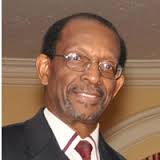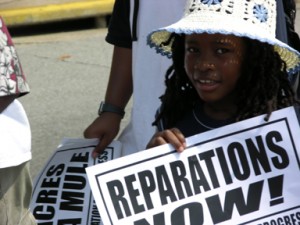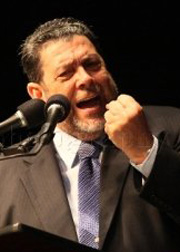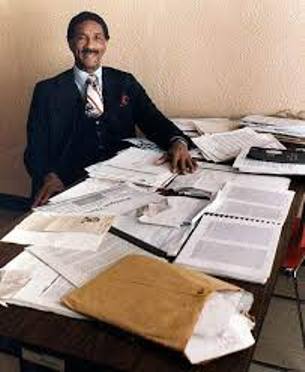Is Europe Ready For Reparations? CARICOM Is!
December 11, 2013
The idea of reparations for slavery has been circulating in the Caribbean for some time. But now activists are trying to put some critical mass to it by calling formally on former colonizers from United Kingdom, France, The Netherlands, and other countries to apologize and pay compensation for the colonial period. Kalilah Enriquez of CEEN News reports on a meeting held in Jamaica yesterday (see video above).
VOD: Of course, this relates directly to the struggle in the United States for reparations for the descendants of Africans here, as seen in the article by Dr. Ron Daniels below. Additionally, REPARATIONS FROM THE BANKS AND CORPORATIONS WHICH HAVE LAID WASTE TO THE NATION’S LARGEST BLACK MAJORITY CITY, AND ITS POOREST, DETROIT, MUST ALSO BE THE ORDER OF THE DAY, NOT FURTHER AUSTERITY UNDER BANKRUPTCY!
Revitalizing the U.S. Reparations Movement
CARICOM Initiative Could Provide the Spark
Revitalizing the U.S. Reparations Movement
[For publication the Week of October 7, 2012]
By Dr. Ron Daniels
A few days before this year’s Congressional Black Caucus Foundation, Inc. Annual Legislative Conference (CBCINC-ALC), I received a call to ask my opinion as to whether the Reparations Issues Forum should be on the agenda. The Forum has been standard fare every year as a way of promoting HR-40, the Reparation’s Study bill, championed by Congressman John Conyers, Jr., and as a vehicle to discuss strategies for the coming year. The question was understandable given the relatively moribund state of the Reparations movement in the U.S.; a reality that is the consequence of the passing/transition of some of the key leaders of the movement, the decline of reparations advocacy organizations and the difficulty of gaining traction on the issue with the first African American President in the White House.
However, none of these factors negate the validity and relevance of the issue. Therefore, I answered in the affirmative but strongly suggested that the Forum highlight events or developments that might provide a new spark to the U.S. Reparations Movement. In the past State Senator Bill Owen’s proposal that the Massachusetts legislature pay reparations to African Americans in that state; Deadria Farmer-Paellmann’s legal campaign against U.S. corporations that benefitted from slavery; the National Black United Front’s “We Charge Genocide” Petition Campaign; December 12th Movement’s Millions Reparations March; Randall Robinson’s highly acclaimed book The Debt; and, The National Coalition for Reparations for African Americans’ (N’COBRA) Reparations Legal Team are examples of actions and events that breathed life into the movement and gave it momentum at particular moments. Unfortunately, in recent years there has been no significant action or event to keep reparations on the front burner of the discourse about Black interests and aspirations. Indeed, the election of the first African American President has likely had a chilling effect in terms of advancing the issue.
But, as I informed the conveners of the Forum, recent developments in the Caribbean have the potential for dramatically changing the tide in the U.S. and Pan African World. Spearheaded by Dr. Ralph Gonsalves, Prime Minister of St. Vincent and the Grenadines, in July Caribbean Community (CARICOM) leaders “agreed to the formation of a region-wide Reparations Commission to seek compensation from Europe for native genocide and enslavement of Africans during colonisation.” Subsequent to this historic resolution, PM Gonsalves convened a major Reparations Conference, September 15-17th in St. Vincent. The delegates agreed to form Reparation Commissions in each Caribbean nation. In addition, PM Gonsalves and several Caribbean leaders utilized the annual convening of the U.N. General Assembly as a platform to boldly incorporate the demand for reparations into their speeches. The CARICOM Reparations Initiative is a historic development, a potential game changer, not only in terms of the potential impact on the Reparations Movement in this country, but the prospect of a resurgent progressive Pan-Africanism, with a renewed focus on the root causes of the “underdevelopment” of people of African descent on the continent and in the Diaspora.
Another development which could spark a renewed interest in the U.S. Reparations Movement is the discovery of a little known speech by Dr. Martin Luther King, Jr. that addresses the issue. On the morning of the Reparations Issues Forum, I received an urgent email and voicemail message from SIRIUS/XM Radio Talk Show Host Mark Thompson, urging me to listen to an excerpt of a speech by Dr. King. Mark obviously felt it would be relevant to the subject. He was absolutely correct. In the space of two minutes, Dr. King recounts a range of benefits provided to European immigrants and White farmers like the Homestead Act that were systematically denied to the formerly enslaved Africans. In so doing, he emphatically lays out the equivalent of a rationale for reparations and concludes by proclaiming, when we come to Washington …we’re coming to get our check.” When we played the clip the audience was stunned and exhilarated. Never before had the participants heard such a ringing rationale for reparations, coming from the lips of the world’s most revered civil rights leader! Everyone instantly recognized that these words from Dr. King could be invaluable in providing legitimacy to the righteous demand for reparations.
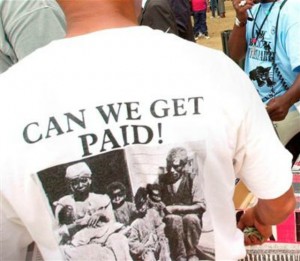 I was delighted to moderate the Reparations Issues Forum this year because the developments above could well breathe new life into the quest for Africans in America to achieve a yet unfulfilled aspiration – reparations to repair the cultural, psychological, spiritual and physical damage to our people as a direct consequence of the holocaust of enslavement. Moreover, with the input of a Panel consisting of City Councilwoman JoAnn Watson of Detroit, Dr. Julianne Malveaux, Black America’s leading political-economist and Attorney Nkechi Taifa, Senior Policy Analyst, Open Society Foundations, an action agenda to revitalize the U.S. Reparations Movement was devised.
I was delighted to moderate the Reparations Issues Forum this year because the developments above could well breathe new life into the quest for Africans in America to achieve a yet unfulfilled aspiration – reparations to repair the cultural, psychological, spiritual and physical damage to our people as a direct consequence of the holocaust of enslavement. Moreover, with the input of a Panel consisting of City Councilwoman JoAnn Watson of Detroit, Dr. Julianne Malveaux, Black America’s leading political-economist and Attorney Nkechi Taifa, Senior Policy Analyst, Open Society Foundations, an action agenda to revitalize the U.S. Reparations Movement was devised.
The action agenda includes: the widespread circulation of Dr. King’s speech which provides a rationale for reparations; an Open Letter to President Barack Obama from Congressman John Conyers, Jr. requesting that the President support HR-40, the Reparations Study Bill; a series of four community-based regional hearings on HR-40, chaired by Congressman Conyers with a stellar Panel of Resource People like Dr. Claud Anderson, Dr. Ray Winbush, Dr. Julianne Malveaux, Professor Charles Ogletree, Dr. Iva Carruthers, Attorney Nkechi Taifa and Councilwoman JoAnn Watson to mention a few; utilizing Dr. King’s assessment as a framework, the convening of a Special Hearing in Selma, Alabama with Black farmers, many of whom still feel aggrieved despite the settlement with the Department of Agriculture; an invitation extended by Congressman John Conyers, Jr. to Dr. Ralph Gonsalves to be a Special Guest and Keynote Speaker for the 2014 CBCINC-ALC Reparations Issues Forum; finally, the Institute of the Black World 21st Century (IBW) will contribute to the process by establishing a Reparations Resource Center on its website www.ibw21.org where interested parties can access important articles, documents, speeches and other relevant materials that might be useful for education, advocacy and organizing
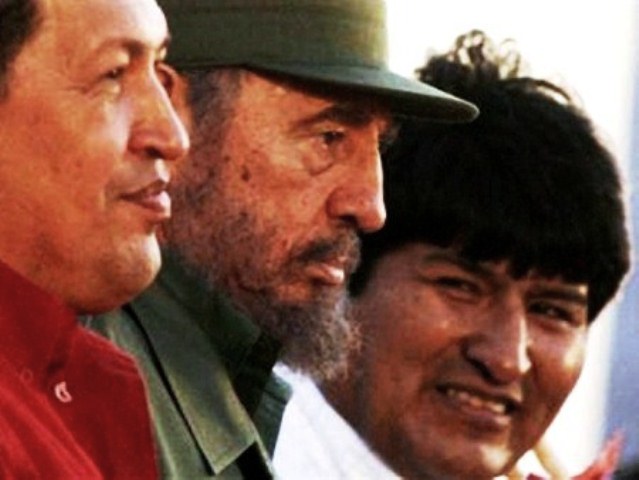
The late Venezuelan Pres. Hugo Chavez, Cuban leader Fidel Castro, and Bolivian President Evo Morales are shown in Havana.
Pres. Morales confronted a European Union conference with a stunning demand for reparations. (See link to his speech below.)
Inspired by the incredible developments noted above and armed with a feasible action agenda, we have an opportunity to revitalize the Reparations Movement in the U.S. In remembrance of our ancestors, a luta continua … the struggle continues!
Dr. Ron Daniels is President of the Institute of the Black World 21st Century and Distinguished Lecturer at York College City University of New York. His articles and essays also appear on the IBW website www.ibw21.org and www.northstarnews.com . To send a message, arrange media interviews or speaking engagements, Dr. Daniels can be reached via email at info@ibw21.org
– See more at: http://ibw21.org/vantage-point/revitalizing-the-u-s-reparations-movement/#sthash.5bmfQTQy.dpuf
http://theblacklistpub.ning.com/group/obituaries/forum/topics/remember-ray-jenkins-the
http://voiceofdetroit.net/2013/09/01/i-too-can-demand-repayment-evo-morales-pres-bolivia/


